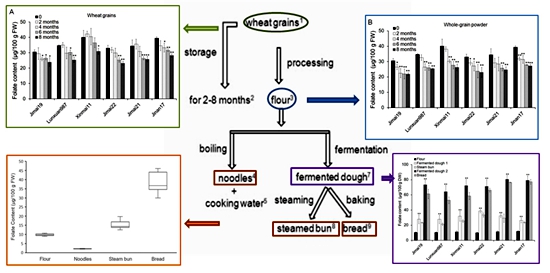Suggestions to Improve Folate Retention in Wheat-based Foods
Recently, crop metabolism regulation and nutrition biofortification team from Biotechnology Research Institute has done a systematic analysis of folate content and folate retention in wheat grains and wheat-based foods during storage, processing and cooking, which will help to guide industrial/household preparation of wheat-based foods for folate nutrition. The related results published on Food chemistry.
Folates, which belong to water-soluble vitamin B (B9), are essential micronutrients for human health. Humans are unable to produce folates and must depend on dietary consumption. Wheat is one of the three staple foods worldwide, and wheat-based foods are commonly consumed in daily life, especially in North China. In order to investigate the natural variation of folates among wheat cultivars and identify high folate materials as direct diet or for breeding, the research team of Zhang Chunyi cooperated with Ye Xingguo's research team to study the grain folate contents of 360 wheat samples and identified 52 wheat cultivars as good sources of folates. Because folates are labile compounds that a variety of factors, including UV light, heating, air, and pH levels, can lead to their inter-conversion or degradation, and these factors may occur in the process of food storage, processing, and cooking. The two teams then continued to assess the effects of storage, processing and cooking methods on folate content and to identify factors that have a significant impact on folate retention in wheat grains and wheat-based foods. The result showed that the folate loss in wheat grains was 14% after 4-month storage and 26% after eight-month storage. The milling process with an extraction rate of 70% led to a serious loss of folate (71%). The folate retention rate in noodles was 78%. However, yeast fermentation enhanced the folate levels in steamed bun and bread by1.5–4 times, even though boiling, steaming and baking led to a folate loss of 11-16%. Thus, steamed buns and bread are good sources of folates.
Dr. Liang Qiuju form Biotechnology Research Institute and associate professor Wang Ke from Crop Science Institute were co-first author, and Professor Ye Xingguo and Professor Zhang Chunyi were co-correspondence authors. This study was supported by the National Special Program for Transgenic Research, Collaborative Innovation Action, Agricultural Science, and Technology Innovation Program of the Chinese Academy of Agricultural Sciences, and public laboratory of the Biotechnology Research Institute, Chinese Academy of Agricultural Sciences for use of the HPLC and triple-quadrupole MS/MS instrument, and for providing technical assistance.

By Liang Qiuju (liangqiuju@caas.cn)
-
 Apr 18, 2024Opening Ceremony of the Training Workshop on Wheat Head Scab Resistance Breeding and Pest Control in Africa Held in CAAS
Apr 18, 2024Opening Ceremony of the Training Workshop on Wheat Head Scab Resistance Breeding and Pest Control in Africa Held in CAAS -
 Apr 03, 2024IPPCAAS Co-organized the Training Workshop on Management and Application of Biopesticides in Nepal
Apr 03, 2024IPPCAAS Co-organized the Training Workshop on Management and Application of Biopesticides in Nepal -
 Mar 28, 2024Delegation from the School of Agriculture and Food Science of University College Dublin, Ireland Visit to IAS, CAAS
Mar 28, 2024Delegation from the School of Agriculture and Food Science of University College Dublin, Ireland Visit to IAS, CAAS -
 Mar 25, 2024Director of World Food Prize Foundation visited GSCAAS
Mar 25, 2024Director of World Food Prize Foundation visited GSCAAS -
 Mar 20, 2024Institute of Crop Sciences (ICS) and Syngenta Group Global Seeds Advance Collaborative Research in the Seed Industry
Mar 20, 2024Institute of Crop Sciences (ICS) and Syngenta Group Global Seeds Advance Collaborative Research in the Seed Industry
